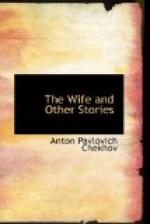A silence follows. Katya straightens her hair, puts on her hat, then crumples up the letters and stuffs them in her bag—and all this deliberately, in silence. Her face, her bosom, and her gloves are wet with tears, but her expression now is cold and forbidding.... I look at her, and feel ashamed that I am happier than she. The absence of what my philosophic colleagues call a general idea I have detected in myself only just before death, in the decline of my days, while the soul of this poor girl has known and will know no refuge all her life, all her life!
“Let us have lunch, Katya,” I say.
“No, thank you,” she answers coldly. Another minute passes in silence. “I don’t like Harkov,” I say; “it’s so grey here—such a grey town.”
“Yes, perhaps.... It’s ugly. I am here not for long, passing through. I am going on today.”
“Where?”
“To the Crimea... that is, to the Caucasus.”
“Oh! For long?”
“I don’t know.”
Katya gets up, and, with a cold smile, holds out her hand without looking at me.
I want to ask her, “Then, you won’t be at my funeral?” but she does not look at me; her hand is cold and, as it were, strange. I escort her to the door in silence. She goes out, walks down the long corridor without looking back; she knows that I am looking after her, and most likely she will look back at the turn.
No, she did not look back. I’ve seen her black dress for the last time: her steps have died away. Farewell, my treasure!
THE PRIVY COUNCILLOR
AT the beginning of April in 1870 my mother, Klavdia Arhipovna, the widow of a lieutenant, received from her brother Ivan, a privy councillor in Petersburg, a letter in which, among other things, this passage occurred: “My liver trouble forces me to spend every summer abroad, and as I have not at the moment the money in hand for a trip to Marienbad, it is very possible, dear sister, that I may spend this summer with you at Kotchuevko....”
On reading the letter my mother turned pale and began trembling all over; then an expression of mingled tears and laughter came into her face. She began crying and laughing. This conflict of tears and laughter always reminds me of the flickering and spluttering of a brightly burning candle when one sprinkles it with water. Reading the letter once more, mother called together all the household, and in a voice broken with emotion began explaining to us that there had been four Gundasov brothers: one Gundasov had died as a baby; another had gone to the war, and he, too, was dead; the third, without offence to him be it said, was an actor; the fourth...
“The fourth has risen far above us,” my mother brought out tearfully. “My own brother, we grew up together; and I am all of a tremble, all of a tremble!... A privy councillor with the rank of a general! How shall I meet him, my angel brother? What can I, a foolish, uneducated woman, talk to him about? It’s fifteen years since I’ve seen him! Andryushenka,” my mother turned to me, “you must rejoice, little stupid! It’s a piece of luck for you that God is sending him to us!”




